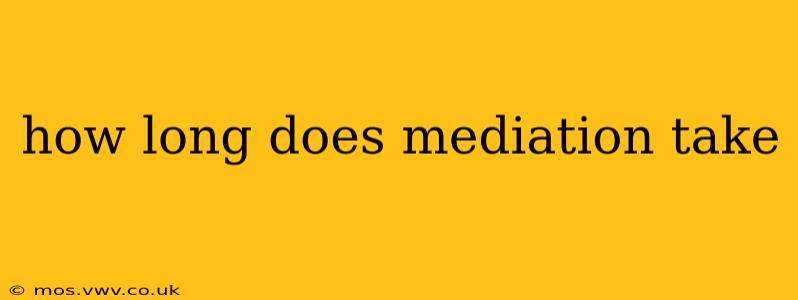Mediation, a process designed to resolve disputes outside of court, offers a flexible and often faster alternative to traditional litigation. However, the duration of mediation can vary significantly depending on several factors. This guide will explore the typical timeframe, influencing factors, and what you can expect during the mediation process.
What Factors Influence Mediation Length?
Several key factors influence how long a mediation session lasts:
-
Complexity of the Issue: Simple disputes, such as neighbor disagreements or minor contract breaches, might resolve within a few hours. Complex cases involving multiple parties, substantial financial implications, or intricate legal arguments can extend over several days or even weeks, potentially requiring multiple sessions.
-
Number of Parties Involved: More parties generally mean more perspectives and potential points of contention, prolonging the process. Each party needs adequate time to present their case and participate in negotiations.
-
Preparation Level of the Parties: Parties who come prepared with organized documentation, clear statements of their positions, and a willingness to compromise tend to expedite the process. Conversely, inadequate preparation can significantly delay the proceedings.
-
Mediator's Style and Experience: The mediator's approach and experience play a vital role. A skilled mediator can guide the discussion efficiently, identify common ground, and manage disagreements constructively, resulting in shorter sessions.
-
Willingness of Parties to Compromise: The most significant factor influencing duration is the parties' willingness to negotiate and find common ground. If parties are entrenched in their positions and unwilling to compromise, mediation might take longer or even fail to reach a resolution.
How Long Does Mediation Typically Take?
While there's no set timeframe, many mediations are completed within a single day, ranging from a few hours to eight hours. However, multi-day mediations are not uncommon, especially for complex commercial or family disputes.
What Happens During a Mediation Session?
A typical mediation session generally involves the following stages:
- Opening Statements: Each party presents their perspective on the dispute.
- Separate Caucuses: The mediator meets privately with each party to understand their interests and priorities.
- Joint Sessions: The mediator facilitates communication between parties, helping them to identify common ground and potential solutions.
- Negotiation and Bargaining: Parties engage in negotiations, exploring various options for resolution.
- Agreement and Documentation: Once an agreement is reached, it is formally documented, often in a legally binding contract.
How Can I Prepare for Mediation to Shorten the Process?
Careful preparation is crucial for efficient mediation. This includes:
- Gathering all relevant documents: Compile all documentation related to the dispute.
- Clearly defining your objectives: Identify your desired outcomes and priorities.
- Developing a realistic settlement range: Establish a range of acceptable outcomes.
- Practicing communication skills: Prepare to articulate your position clearly and concisely.
- Choosing the right mediator: Select a mediator with experience in the relevant area of law.
Can Mediation Fail?
Yes, mediation doesn't guarantee a successful resolution. If parties remain unwilling to compromise or find common ground, the mediation may end without an agreement. However, even in unsuccessful mediations, the process can often improve communication and understanding between the parties, paving the way for future negotiations or alternative dispute resolution methods.
What if My Mediation Takes Longer Than Expected?
If your mediation extends beyond the initially anticipated timeframe, it’s crucial to communicate with your mediator and the other parties involved. The mediator can help assess the progress and determine if additional time is needed to reach a resolution or if alternative strategies should be considered.
By understanding the factors influencing mediation length and preparing adequately, you can significantly improve the chances of a timely and successful outcome. Remember, the goal is a mutually agreeable resolution, and the process is designed to be flexible and responsive to the specific needs of the parties involved.
